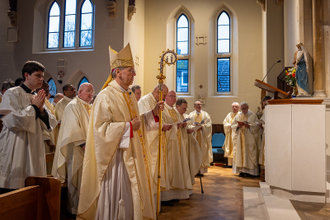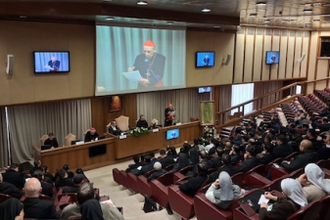Vatican Curia Spiritual Exercises: 'Women open the Gospels to us'

St Mother Teresa of Calcutta
Source: Vatican News Service
Fr José Tolentino Mendonça focussed of the beauty of women's faith in today's Lenten meditation, given to the Pope and Roman Curia and Casa 'Gesù Divin Maestro' in Ariccia.
This morning Fr Tolentino discussed the women throughout Luke's Gospel. "The women in the Gospel prefer to express themselves with gestures. Their faith seeks comfort through touch - tangible, emotional, disarming - rather than through abstraction," he said.
The way women accompanied the Lord was different than how the men did, he said: "The women 'were with' Jesus exactly in the same way as the Twelve. They made his destiny their own destiny. But the text adds one thing regarding only them: 'they were serving Jesus.'"
Suggesting that the women's reaction is deeply evangelical, Fr Tolentino observed that they never ask Jesus the questions that the disciples ask Him such as "Lord, will only a few people be saved" (Luke 13:23)? or "Lord, what must I do to inherit eternal life (Luke 10:25)?
Rather, he noted, their declarations are concrete such as: "Blessed is the womb that carried you and the breasts at which you nursed" (Luke 11:27).
With women, he said, there is a "ripple of reality that intervenes in order to shape faith. In this way it does not remain a prisoner - as often happens to our faith - rationalistic, lived mechanically according to doctrine or ritual." It is because they are in touch with daily life that they give "perfume to the faith."
The priest also recognized that the women in Luke's Gospel, such as the women of Jerusalem or the widow of Naim, cry. St Gregory Nanzianzen, he said, describes these tears as a baptism - which many other saints have experienced.
Concluding his meditation with the image of the woman washing Jesus' feet with her tears, he noted: "What this woman gave thus serves Jesus as the litmus test for what the Pharisee refused to give."
"It is this unheard-of hospitality which Jesus wants to praise - that thirst, expressed in tears - which is our turn to learn."
On Tuesday afternoon, Fr Tolentino had reflected on a verse from John's Gospel: "After this, aware that everything was now finished, in order that the scripture might be fulfilled, Jesus said, 'I thirst' " (John 19:28).
There are other occurrences in John's Gospel that help us understand Jesus' words, for instance when Jesus is thirsty and asks the Samaritan woman for a drink (John 4:13-15), and the declaration: "whoever believes in me will never thirst" (John 6:35).
Saint Mother Teresa of Calcutta, he highlighted, experienced Jesus' thirst "in a mystical experience."
"In an almost physical way she felt Jesus' thirst calling her to give her life in service to the thirst of the poor and rejected, to the poorest of the poor."
The Holy Spirit, he said, is the gift given to us to satiate our thirst is the Holy Spirit.
"We are called to live even suffering, persecution, illness, and joyfully. We are called to live every situation with lively hope. Why? Because the Holy Spirit, God's strength, wind, breeze, breath, is in us."


















